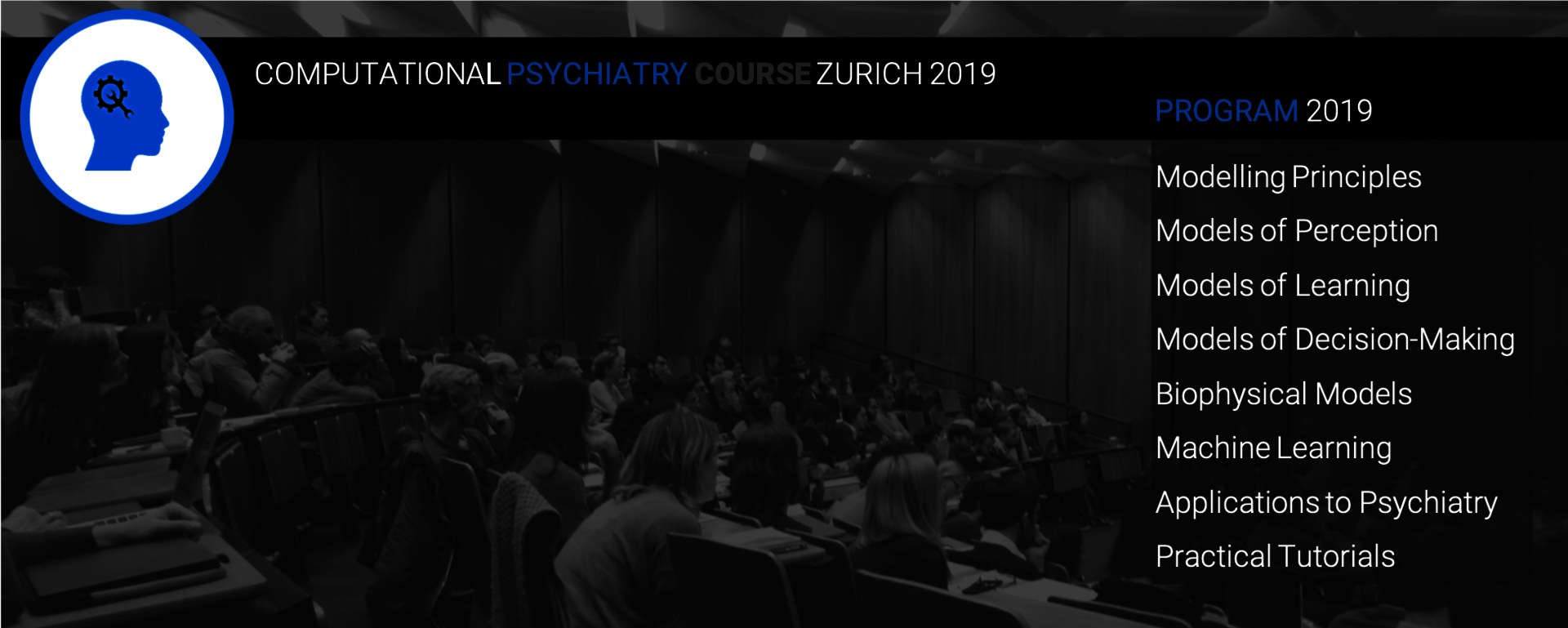
COMPUTATIONAL PSYCHIATRY COURSE 2019
2nd September 2019 - 6th September 2019
ABOUT
This course is designed to provide students across fields (neuroscience, psychiatry, physics, biology, psychology....) with the necessary toolkit to master challenges in computational psychiatry research.
The CPC is meant to be practically useful for students at all levels (MDs, Master, PhD, Postdoc, PI) coming from diverse backgrounds (neuroscience, psychology, medicine, engineering, physics, etc.), who would like to apply modeling techniques to study learning, decision-making or brain physiology in patients with psychiatric disorders. The course will teach not only the theory of computational modeling, but also demonstrate software in application to example data sets.
You can find detailed information on our website or follow us on twitter and facebook.
DETAILS
The CPC is divided into two parts: The main course (day 1-4) and in-depth practical tutorials (day 5).
ETH and UZH students can get 3 ECTS for participating in this course (performance assessment: short oral exam on 20.09.2019 between 2pm and 6pm at the TNU). If you are interested in getting ECTS, please also register on ETH mystudies or on the UZH catalogue.
Main Course
The first day covers topics in Psychiatry providing a conceptual basis for the type of questions that Computational Psychiatry will need to address.
The second day explains basic modelling principles and covers models of perception and learning (Bayesian Models of Perception, Bayesian Hierarchical Learning, Predictive Coding, Reinforcement Learning)
The third day includes models of planning and decision making (Active Inference, Drift Diffusion Models), Machine Learning, Biophysical Models (DCMs), and advanced models of connectivity (Whole Brain Models).
The fourth day features a series of talks by leading scientists on the applications of Computational Psychiatry, including a panel discussion on the challenges and future of Computational Psychiatry.
Practical Tutorial Sessions
The practical tutorials will provide 3h, small-group, in-depth and hands-on sessions on a specific modelling approach. To get the most out of the tutorial, students are advised to bring their own laptops along. The practical sessions cover only open-source software packages. The code can be found under the respective links below:
- Bayesian Learning using the Hierarchical Gaussian Filter from TAPAS
- Active inference using the Active Inference Toolbox
- Reinforcement Learning & Decision Making using the hBayesDM Package
- Model Inversion using the Variational Bayes Toolbox
- Machine Learning using NISPAT
- Dynamic Causal Modelling using the SPM-DCM Package
- Whole Brain Models using TAPAS rDCM and HUGE
- Metacognition using the HMeta-d Toolbox
MATERIAL
- Lecture slides
- Lecture videos
- Code
- Reading
SPEAKERS
Woo-Young Ahn, Seoul National University, South Korea
Michael Browning, Universtity of Oxford, UK
Philip Corlett, Yale School of Medicine, USA
Tore Erdmann, Scuola Internazionale Superiore di Studi Avanzati, Italy
Olivia Faull, University of Zurich & ETH Zurich, Switzerland
Stephen Fleming, UCL London, UK
Stefan Frässle, University of Zurich & ETH Zurich, Switzerland
Claire Gillan, Trinity College Dublin, Ireland
Samuel Harrison, University of Zurich & ETH Zurich, Switzerland
Jakob Heinzle, University of Zurich & ETH Zurich, Switzerland
Markus Herdener, University of Zurich, Switzerland
Sandra Iglesias, University of Zurich & ETH Zurich, Switzerland
Roland von Känel, University Hospital Zurich, Switzerland
Rebecca Lawson, University of Cambridge, UK
Andre Marquand, Donders Institute, Netherlands
Christoph Mathys, SISSA, Italy
Michael Moutoussis, Max Planck UCL Centre London, UK
Rosalyn Moran, University of Bristol, UK
Thomas Parr, UCL London, UK
Gina Paolini, University of Zurich & ETH Zurich, Switzerland
Frederike Petzschner, University of Zurich & ETH Zurich, Switzerland
Lionel Rigoux, Max Planck Institute for Metabolism Research Cologne, Germany
Dario Schöbi, University of Zurich & ETH Zurich, Switzerland
Helen Schmidt, University of Zurich & ETH Zurich, Switzerland
Philipp Schwartenbeck, UCL London, UK
Jakob Siemerkus, University of Zurich & ETH Zurich, Switzerland
Klaas Enno Stephan, University of Zurich & ETH Zurich, Switzerland
Lilian Weber, University of Zurich & ETH Zurich, Switzerland
Thomas Wolfers, Donders Institute, Netherlands
Yu Yao, University of Zurich & ETH Zurich, Switzerland
Ariel Zylberberg, Columbia University New York, USA
CONTACT
Translational Neuromodeling Unit
University & ETH Zurich
Mail: cpcourse(at)biomed.ee.ethz.ch
TEAM
Klaas Enno Stephan
Frederike Petzschner
Administration: Heidi Brunner
Contact: Nicole Zahnd & Katharina Wellstein

